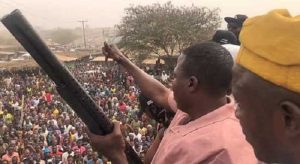
Yoruba activist Sunday Adeyemo, also known as Sunday Igboho, has stated that only God can take away his life, stressing that no human can kill him.
Recall that Igboho had also issued a quit notice to herdsmen accused of sundry crimes in the Ibarapa area of Oyo and enforced same.
He also chased herdsmen from a community in Ogun state after one of his houses in Ibadan, Oyo state capital, was gutted by fire by those “opposed to his fighting.”
Speaking in an interview with The Punch on Sunday, Sunday Igboho disclosed that his family is worried over the cause he has been fighting.
According to the activist, no human being can kill him and he will not be distracted.
“I am not afraid of anything or anyone but God. God is the owner and controller of every soul. It is only God who can kill me. No human being can kill me, so I cannot be afraid of any mortal,” Sunday Igboho said.
“My children challenge and persuade me to quit every day. They wave the caution sign to me every time. My wife is also very worried about the cause that I fight but I have to do this for the liberation of my people, anyway. But I am equally worried for my people who are being dehumanized and oppressed in their own territory for no just reason. Those who should address the issue just fold their arms and watch because they are compromised. This struggle is for the good of all so that when I am gone they would not live in subjection.”
Igboho said he was ready to work with Governor Seyi Makinde in as much as the governor “recognises the fact that we have the fundamental right to secure our people and to protect their interest.”
“We are sure that the governor is able to feel the pulse of the people who are feeling the heat from the killer herdsmen and we believe that he would rise up to the occasion and do the needful,” he said.
“If they call me for a meeting to discuss the burning issue of security to end the impunity by the killer herders, I shall gladly oblige. I am ready for any genuine approach to stopping the herders’ madness against our parents, brothers and sisters in Yorubaland.”


